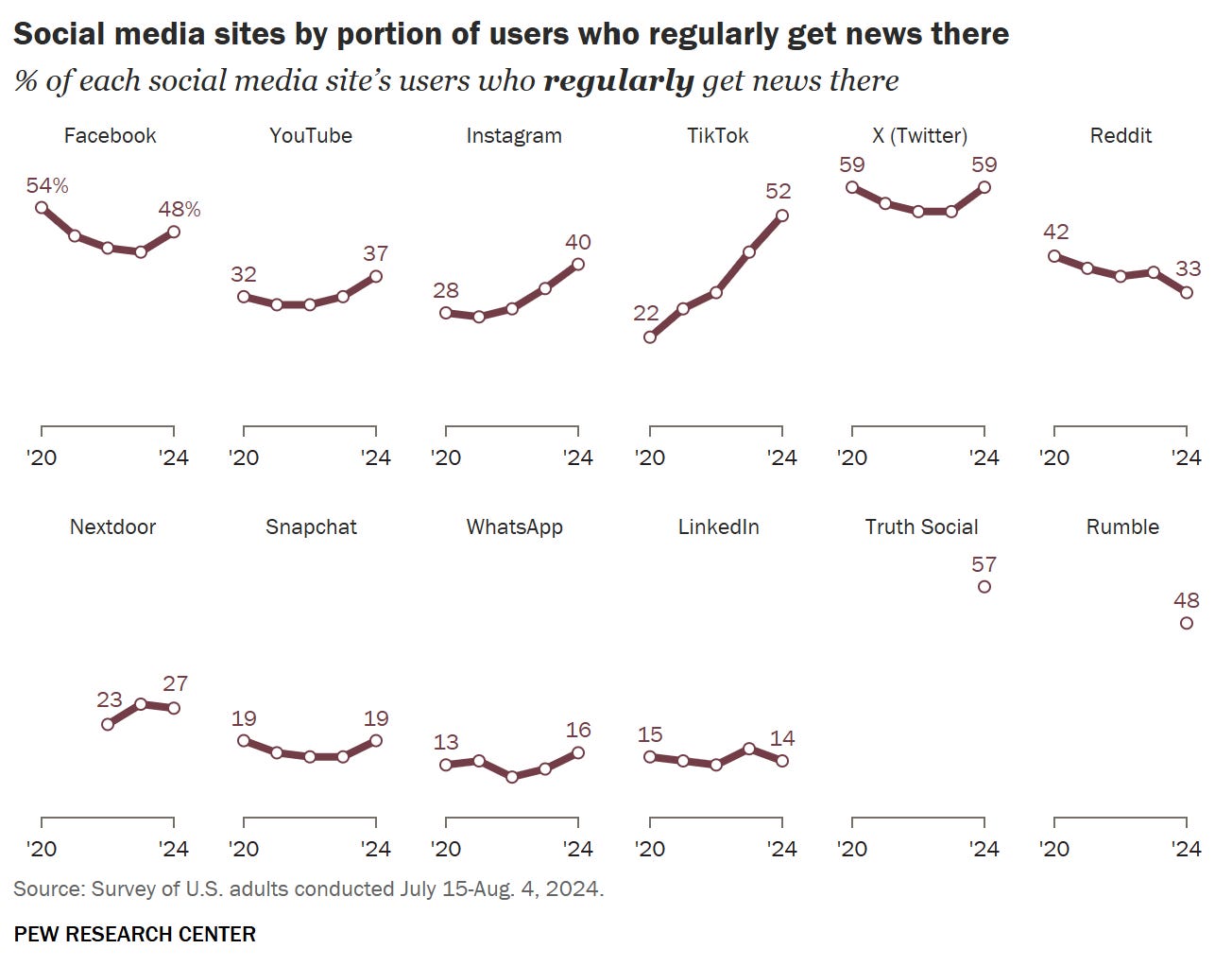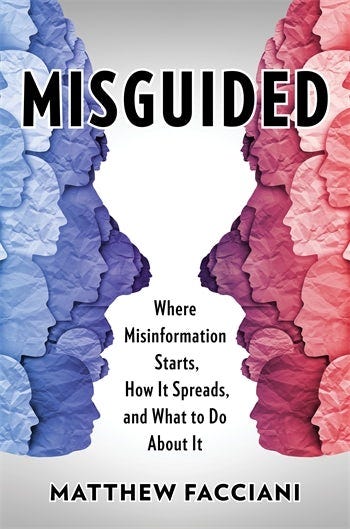How misguided beliefs are formed: Interview + book giveaway with Matthew Facciani
Issue 173: Matthew Facciani shares actionable tips for dealing with misinformation + enter to win a free copy of his new book
Since 2020, the number of people who regularly get their news from social media has risen—particularly for TikTok and Instagram. While these platforms offer convenience and rapid, bite-sized updates, they also breed rampant misinformation that’s hard to detect and even harder to stop.
Understanding why we believe certain stories—and how misinformation spreads—is essential. In Misguided: Where Misinformation Starts, How It Spreads, and What to Do About It, social scientist Matthew Facciani shows how to combat harmful falsehoods at scale. As a postdoctoral researcher in Notre Dame’s Computer Science and Engineering Department, he investigates the psychological and social forces that shape our information habits.
Beyond fact-checking, Matthew reveals how identity, trust, community, and emotion determine what we accept as “truth.” In our interview below, he explains how to engage someone who’s bought into false claims: approach with genuine curiosity rather than trying to prove them wrong.
Learn more about Misguided and order your copy here. Plus, The Power of Us subscribers can win a free physical copy! To enter the giveaway, either…
Be a paid subscriber to the newsletter. Paid subscribers are automatically entered into our book giveaways! We have three more book giveaways with different authors coming up in August, September and November. You can subscribe or upgrade your subcription below.
If you are not a paid subscriber yet, not to worry. Simply leave a comment below about what topics in Misguided interest you the most at the bottom of this post to enter the giveaway.
Note: Giveaway winners must be a resident of the UK, Mainland Europe, Republic of Ireland, Australia, New Zealand, India, South Africa, United States or Canada. (Due to shipping and customs restrictions). Enter before August 5th, 11:59 pm PST. One winner will be selected at random and emailed on August 6th!
Matthew, what does your book teach us about social identity or group dynamics?
Misguided reveals how our beliefs are shaped by social factors. We tend to adopt ideas that reinforce our group identity—whether that’s political, religious, or cultural—because belonging and acceptance matter deeply to us as social creatures. When a claim signals loyalty to our group, we’re more inclined to believe it, even if it’s false. The book explores how this dynamic works, what conditions make it stronger, and what can weaken its grip. Understanding these patterns helps explain why people often cling to misinformation and resist corrections that feel like personal threats.
What is the most important idea readers will learn from your book?
One of the core lessons from Misguided is that our beliefs are shaped as much by our social connections as by evidence or reasoning. We like to think we form opinions based on facts and logic, but in reality, we often adopt beliefs that align with our group identity. What we believe is deeply tied to who we are and where we feel we belong. This helps explain why misinformation spreads so easily. People may share false claims not because they’re misinformed, but because doing so signals loyalty to their group. Correcting those claims with facts can also backfire when beliefs are tied to identity because challenging them can feel like a personal attack. As mentioned above, Misguided, dives into the specific conditions of how identities and groups influence our beliefs so we can all better protect ourselves against misinformation.
Another major lesson in the book is about the social elements of trust. We’re more likely to believe information when it comes from someone we see as “one of us” and who we believe has our best interests in mind. So, if we want to communicate more effectively, especially about polarizing issues, we need to focus less on debating facts and more on listening, establishing respect, and meeting people where they are. That can also mean using trusted messengers and framing messages in ways that resonate with people’s values. Trust is relational, and built on perceptions of both warmth and competence.
In short, combating misinformation isn’t just about sharing facts, it’s also about understanding identity, building trust, and creating space for truth to take hold. Education and media literacy are helpful tools, and the book explores both, but they aren’t enough without recognizing the social dynamics that shape how we process information. We’re all vulnerable to misinformation because our social needs drive us to seek belonging and support from our groups. Recognizing this is key to reducing our susceptibility to falsehoods.
Why did you write this book and how did writing it change you?
I finished my PhD in June of 2020, where I was studying political polarization and misinformation. Seeing all the misinformation surround COVID-19, and the poor responses to it, made me want to write some of article or op-ed. I realized I had more to say than what might fit in an article, so I tried shopping a book idea around to a few publishers, and was pleasantly surprised to see interest!
More broadly, I was frustrated by how often we treat misinformed people as irrational or stupid, instead of recognizing the powerful social and emotional forces that shape all of our beliefs. I wanted to go deeper than fact-checks and instead offer readers a clearer picture of how identity, trust, community, and emotion influence what we accept as “truth.” The more I explored the social dynamics behind misinformation, the more I saw how everyone is vulnerable, not just “other people.” It pushed me to focus less on winning arguments and more on building understanding.
What will readers find provocative or controversial about your book?
I’ve found that some people resist the idea that our beliefs aren’t entirely our own—that identity, community, and emotion often shape what we accept as “truth” more than facts or logic. Misguided challenges the myth of the purely rational individual and invites readers to see belief as a deeply social process. That can feel uncomfortable, especially in a culture that prizes personal responsibility and individualism.
But that discomfort can be a powerful starting point. When we understand how social forces influence belief, we become more aware of our own biases and less likely to dismiss others as simply ignorant or irrational. Instead, we’re more inclined to respond with empathy. That doesn’t mean giving up on truth; it means meeting people where they are and acknowledging how belonging and identity shape how we all interpret the world. That’s where real progress begins.
Do you have any practical advice for people who want to apply these ideas (e.g., three tips for the real world)?
One key tip is to broaden your own social identities. In Misguided, I explain how having a more diverse set of meaningful identities can make us less vulnerable to misinformation by reducing the pressure we place on any one identity for meaning and self-worth. In practice, this might look like exploring new hobbies, forming friendships with people from different backgrounds, and staying open-minded in how you engage with the world.
Another important strategy is improving how we talk with people who see things differently. Trust is essential, and that starts with curiosity and connection, not correction. People are more open to new perspectives when they feel heard and respected, so begin by asking questions, listening closely, and finding shared values. The goal is not to try and change their mind, but instead to increase the chances they'll truly hear your perspective.
Finally, media and digital literacy are more important than ever. Being media literate means pausing to ask who benefits from a message, recognizing when content is designed to provoke strong emotions, and cross-checking claims with credible sources. Don’t rely on popularity or credentials alone; context and expertise matter. Slowing down and thinking critically is one of the best defenses we have against misinformation.
Catch up on the last one…
Last week, we shared an exclusive first look at content from our upcoming book, Smarter Together. On the verge of the greatest prize in exploration, polar explorer Roald Amundsen lured his unsuspecting crew aboard his ship, the Fram, with promises of an Arctic voyage—only to reveal beyond the glare of prying eyes that their true destination lay at the planet’s icy bottom. As secrets thawed and loyalties crystallized, the team found itself united in a daring race to the South Pole, bound together by “ours” instead of “mine.”








Im glad you discussed misinformation from social point of view. So much of solutions revolve around communications frameworks that we don't talk enough that people shape infirnation environment and that misinformation narratives are socially constructed and get meaning from relationships and collective belonging.
Well done!
We are all too familiar with the often malevolent nature of Misinformation. Are there any potentially constructive upsides?